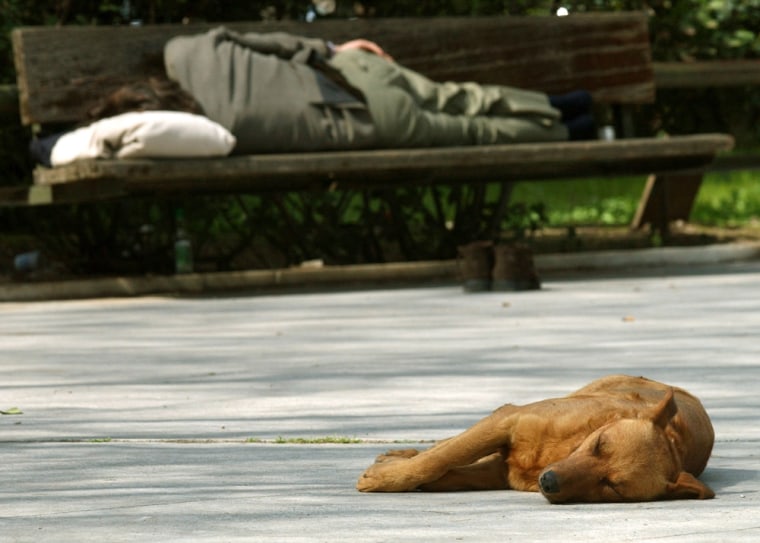As if Greece doesn't have enough to deal with in the increasingly tight run up to the games. Now, along with unfinished venues, power outages, terrorism threats, and bush fires, it has the unwelcome image of packs of stray dogs to potentially scupper the Olympic image.
The animal loving British media has been circulating stories claiming that up to 15,000 stray dogs face being poisoned to death by Greek authorities out of a fear that packs of dogs roaming the streets will destroy the image of a modern and clean Athens city during the 2004 Olympic Games.
But Greek officials have assured animal welfare organizations that while they are making moves to control the stray dog population, they have done so in a responsible and appropriate manner.
‘Barbaric’ fix
The Royal Society for the Prevention of Cruelty to Animals (RSPCA) is still extremely concerned about the welfare of Greek dogs.
The RSPCA does not believe any government backed poisoning will take place prior to the Olympics, but fears that some unofficial poisoning may happen as Athens struggles to deal with its stray dog population.
The RSPCA has condemned the poisoning of animals as "barbaric" and a "short term fix,” and fears even more dogs could be killed out of "civic pride" closer to the games.
The RSPCA is particularly concerned about a lack of municipal trained staff in Athens to round up dogs humanely and a shortage of shelters to accommodate the huge number of strays.
Recent media reports quote local Greek groups claiming 80 dogs were recently found dead in the coastal resort of Saronida where some of the British team members are expected to stay.
Clean-up tactic of the past
In the past, Greek animal welfare groups claim that the tactic of poisoning animals has been pretty much tolerated, if not encouraged as part of clean up campaigns.
But, "the thing with poisoning is it's so difficult to get proof," said Carol McBeth, director of the Greek Animal Welfare Fund.
"We are worried there will be a kind of ad hoc ‘unofficial’ poisoning," Roslyn Varnes, RSPCA spokesman told NBC News. "There have been cases where garbage guys have poisoned dogs and there is also concern that local citizens, or well meaning local municipal officials, simply out of civic pride, might lend a helping hand."
"The main problem is that there is no real culture of dealing with stray dogs in Greece. There is no tradition of neutering. Euthanasia is illegal and there is a big shortage of dogs homes to provide shelter," said Varnes.
In Athens itself there is only one municipal shelter and three or four private ones, explained Varnes.
"All together they provide shelter for a couple of hundred dogs, whereas there are simply thousands and thousands of strays," said Varnes. "And of the 50 municipalities which make up Athens, only one in city center is actually following the policy of taking them off the streets."
Some successes
According to Liana Alexandri from the Hellenic Animal Welfare Society (HAWS), the tradition of poisoning stray dogs in Greece is a very serious problem, but she believes that the situation has greatly improved over the last few months.
After years of discussion, the government has finally given the municipalities approximately four million euros in financial aid to help the stray dog problem.
The cash infusion is intended to help everything from neutering, to providing shelter and food for the animals, according to Alexandri.
Stray dogs are being collected from six Olympic municipalities and supplemented by animal welfare groups established as soon as Greece won their Olympic bid.
And even if the gesture of cash is somewhat last minute, Alexandri believes that the outcome can only be positive.
"We do things at the last minute here, and OK it might be a bit late but the recent improvements in legislation can only beneficial to the strays and all of us,” said Alexandri.
"We've always had poisoning, always, with large numbers of stray dogs and cats being killed. Every summer we have some poisonings, especially during the tourist season on the islands," explained Alexandri. "But with the Olympics it’s a chance for us all to improve. I'm not sure if the government will continue to give money afterwards, I doubt it, but nevertheless we've had the chance to change public awareness at least."
McBeth, from the Greek Animal Welfare Fund, also commended one successful project where strays have been collected, sterilized, vaccinated and electronically tagged. But her main concern is for the Olympic venue areas in the suburbs, areas where the cycling, football, and equestrian events are taking place.
"They will be keen to make sure the streets are clean, and there simply aren't enough shelters, so I fear the strays may well be poisoned," said McBeth, citing recent front page news where a photo of a dead dog was explained by the fact the hotel manager wanted it out of the way.
David Bowles, the head of the RSPCA International, recently visited Greece to train welfare groups in human dog handling.
Bowles told the British media that "we are seriously concerned that thousands of dogs will be poisoned so that Greece can show that Athens is a pristine, modern city. They do not have the manpower or the shelters to round up all the dogs. A lot of the local authorities simply don't know how to deal with dogs humanely."
